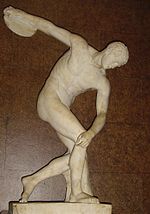Organised athletics are traced back to the Ancient Olympic Games from 776 BC, and most modern events are conducted by the member clubs of the International Association of Athletics Federations. The athletics meeting forms the backbone of the modern Summer Olympics, and other leading international meetings include the IAAF World Championships and World Indoor Championships, and athletes with a physical disability compete at the Summer Paralympics and the IPC Athletics World Championships.
Etymology
The word athletics is derived from the words ἄθλος ('athlos') meaning "contest" and ἄθλον ('athlon') meaning prize.[1] Initially, the term was used to describe in general – i.e. sporting competition based primarily on human physical feats. In the 19th century in Europe, the term athletics acquired a more narrow definition and came to describe sports involving competitive running, walking, jumping and throwing. This definition continues to be the most prominent one in the United Kingdom and most of the areas of the former . Furthermore, foreign words in many and which are related to the term athletics also have a similar meaning.In contrast to this, in much of North America athletics is synonymous with sports in general, maintaining a more historic usage of the term. The word "athletics" is rarely used to refer to the sport of athletics in this region.
History
Antiquity and Middle Ages

The Cotswold Olimpick Games, a sports festival which emerged in 17th century England, also featured athletics in the form of sledgehammer throwing contests.[6] Annually, from 1796 to 1798, L'Olympiade de la République was held in revolutionary France, and is an early forerunner to the modern summer Olympic Games. The premier event of this competition was a running event, but various ancient Greek disciplines were also on display. The 1796 Olympiade marks the introduction of the metric system into sport.[7]
Modern era
The Royal Military College, Sandhurst has claimed to be the first to adopt this in 1812 and 1825, but without any supporting evidence. The earliest recorded meeting was organised at Shrewsbury, Shropshire in 1840 by the Royal Shrewsbury School Hunt. There are details of the meeting in a series of letters written 60 years later by C.T. Robinson, who was a pupil there from 1838 to 1841. The Royal Military Academy at Woolwich held an organised competition in 1849, but the first regular series of meetings was held by Exeter College, Oxford from 1850.[8]The first modern-style indoor athletics meetings were recorded shortly after in the 1860s, including a meet at Ashburnham Hall in London which featured four running events and a triple jump competition.[9][10]
The Amateur Athletic Association (AAA) was established in England in 1880 as the first national body for the sport of athletics and began holding its own annual athletics competition – the AAA Championships. The United States also began holding an annual national competition – the USA Outdoor Track and Field Championships – first held in 1876 by the New York Athletic Club.[11] Athletics became codified and standardised via the English AAA and other general sports organisations in the late 19th century, such as the Amateur Athletic Union (founded in the US in 1888) and the Union des sociétés françaises de sports athlétiques (founded in France in 1889).
An athletics competition was included in the first modern Olympic Games in 1896 and it has been as one of the foremost competitions at the quadrennial multi-sport event ever since. Originally for men only, the 1928 Olympics saw the introduction of women's events in the athletics programme. Athletics is part of the Paralympic Games since the inaugural Games in 1960. Athletics has a very high profile during major championships, especially the Olympics, but otherwise is less popular.
An international governing body, the International Amateur Athletics Federation (IAAF), was founded in 1912; it adopted its current name, the International Association of Athletics Federations, in 2001. The IAAF established separate outdoor World Championships in 1983. In modern times, athletes can receive money for racing, putting an end to the so-called "amateurism" that existed before.
The Comité International Sports des Sourds had been formed by 1922, to govern international deaf sports, including athletics.[12]
The first organized international competitions for athletes with a physical disability (not deaf) began in 1952, when the first international Stoke Mandeville Games were organized for World War II veterans.[12][13] This only included athletes in a wheelchair. The first Paralympic Games were held in 1960. Competitions would over time be expanded to include mainly athletes with amputations, cerebral palsy and visual impairment, in addition to wheelchair events.
Sports
See also: List of athletics events
The International Association of Athletics Federations, the sport's governing body, defines athletics in five disciplines: track and field, road running, race walking, cross country running, and mountain running.[14] All forms of athletics are individual sports with the exception of relay races.
However, athletes' performances are often tallied together by country
at international championships, and in the case of cross country the
finishing times of the top athletes from each team or country are
combined to declare a team victo
Tidak ada komentar:
Posting Komentar